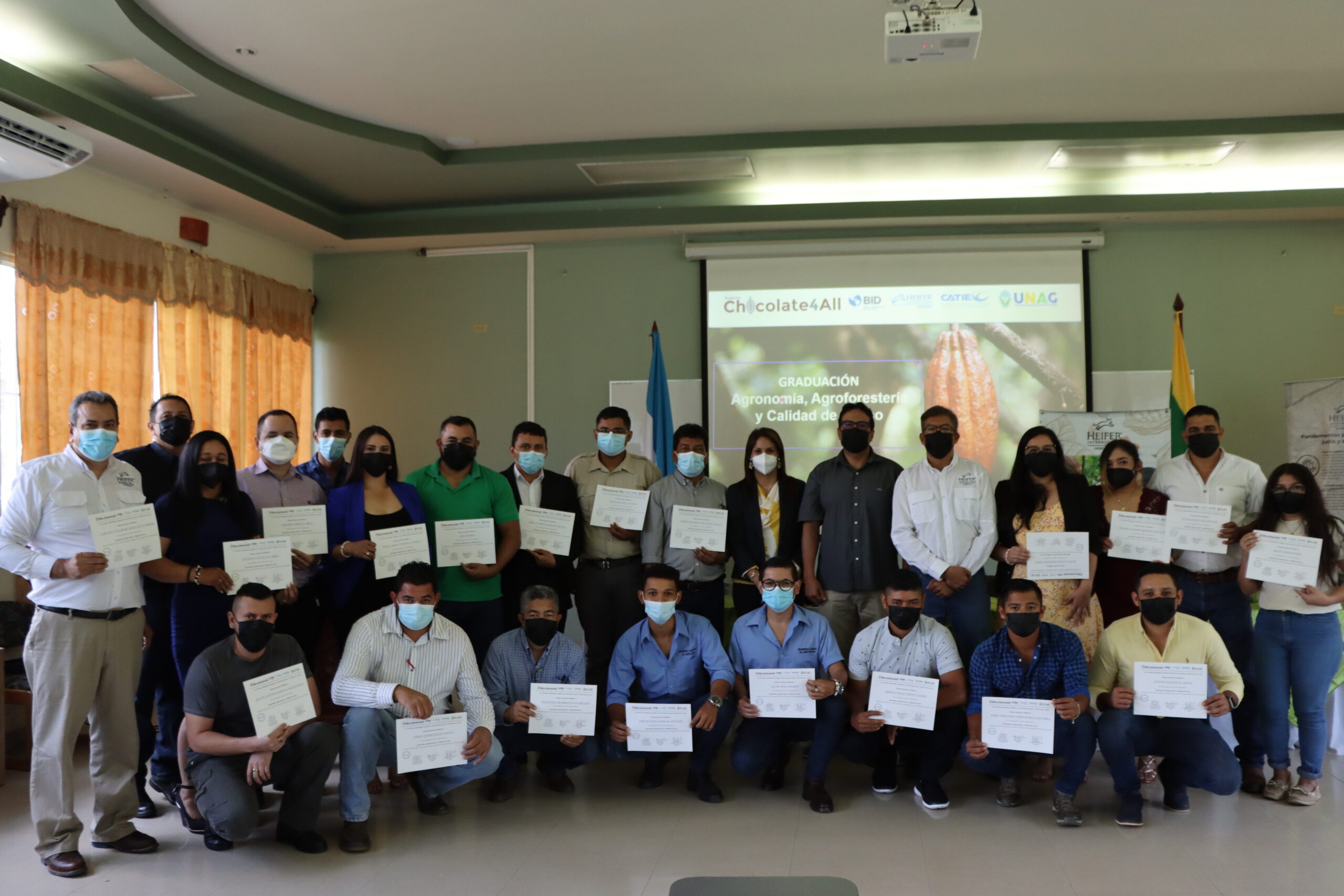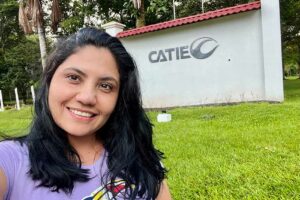Honduran cocoa sector stakeholders strengthened their capacities to improve chocolate production

- Technicians, teachers and students involved in the cocoa value chain graduated from the virtual course: Agronomy, Agroforestry and Cocoa Quality.
April 7, 2022. More than 30 technicians, teachers and students from Catacamas, Honduras, graduated on April 1 from the Agronomy, Agroforestry and Cocoa Quality virtual course. This training initiative enabled participants to learn and update their knowledge in the most innovative areas of cocoa production.
The course was developed within the framework of the Chocolate4All project, which is financed by the Inter-American Development Bank and executed by Heifer Honduras, CATIE (Tropical Agricultural Research and Higher Education Center) and the National University of Agriculture of Catacamas (UNAG).
The training, coordinated by Mariela Leandro, cocoa researcher at CATIE, included virtual sessions over three months, using CATIE's Virtual Classroom platform, as well as a practical field session led by Rolando Cerda, leader of CATIE's Coffee and Cocoa Agroforestry and Genetic Improvement Unit. The virtual sessions included keynote lectures with international cocoa experts, discussion forums, live sessions and reading checks.
According to Cerda, the training covered different topics, including: climate change and cocoa cultivation, design of a cocoa plantation (using clones) to increase yields, cocoa requirements in terms of soil fertilization, integrated pest management (including diseases), design and management of an agroforestry system with cocoa, methodologies to measure the shade of a cocoa plantation, demonstrations of ShadeMotion software to design the shade of a cocoa plantation, research methodologies aimed at measuring ecosystem services in cocoa plantations, and finally, cocoa quality, fermentation and drying, international standards, use of microbiology and organisms for cocoa fermentation and cocoa market.
Antonia Calles, a technician who participated in the course, said that after more than 10 years of working with cocoa, this course was an opportunity to learn new things about the crop that will be very useful in her daily work with the producer families. "Many times because we are working we don't worry about updating our knowledge, and with this course they have really thought of us, so that we are better prepared," she added.
Mario Talavera, dean of UNAG, who was also a participant in the course, said he was completely satisfied with the training process. "All the instructors were always open to offer their knowledge. They gave us a lot of knowledge, a lot of information and many methodologies, which we will now have on hand as reference materials for the future. As professionals it is worthwhile for us to take advantage of this. Today we can say that UNAG has a team of teaching and technical staff trained in cocoa cultivation to make a difference with producers," commented the dean.
Leandro, as course coordinator, said that the training was a very enriching experience because it provided the knowledge and skills necessary to analyze and design improvements in cocoa agroforestry systems, according to the objectives of the Honduran cocoa family. It also contributed to improving cocoa quality by providing the theoretical and practical tools to establish new and modern cocoa farms or to guide the rehabilitation and renovation of old or unproductive cocoa farms.
During the graduation, Cerda urged the graduates to continue using all the course materials, which are still available. "We made them for you and we want you to get the most out of them," he said.
Carlos Rosales, from the management of the Chocolate4All project, recognized the effort made by all the participants to complete and pass the course. "I congratulate you all. I know that this seed that Heifer, CATIE and UNAG planted has been sown in the best soil and will bear much fruit, so I encourage each one of you. We have the tools, the instruments and the knowledge to promote the cultivation of cocoa, we just need to put them into practice, I invite you that we can really be representatives of all this. The cocoa-producing families of Olancho have great expectations," said Rosales.
The course graduation ceremony was attended by Licza Padilla, Academic Vice Rector of UNAG-Honduras, and Jorge Cruz, project manager of HEIFER-Honduras, who said he was proud of the growth of the course participants and the contribution they will make to the country. "In the cocoa chain there are many challenges, one of them being low productivity, hence the importance of these trainings to improve productivity, quality and that producers visualize their farm as a business unit and cooperatives have a business and market vision," concluded Cruz.




More information:
Mariela Leandro
Researcher
Agroforestry and Coffee and Cocoa Genetic Improvement Unit
CATIE
mleandro@catie.ac.cr
Written by:
Karla Salazar Leiva
Communicator
Information Technology and Communication
CATIE
karla.salazar@catie.ac.cr



